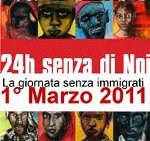
On February the 20th of 2011 many migrant and italian women met in Bologna in order to discuss how to conquer their visibility during the strike and the demonstrations that will take place on March the 1st, and beyond.
Last year many women got on strike and went to the streets. They accepted the challenge of showing what happen when migrant man and women who live in Italy cross their arms for one day, together with those italian men and women who refuse to see their right and their labour under attack, who refuse institutional racism.
Last year many women got on strike and went on the streets, but not so many women as those who could have, and above all who would have. To get on strike, to determine their presence, to make their voice heard, is a double challenge for women, both migrant and italian.
Women absence is determined by the double job they are forced to: care and domestic labour (waged or not) and the exploitation on working places, which affects mainly migrant women.
This situation is the product of a patriarchal system (that has no culture, no nation, no religion, insofar as it is universal) which is expressed by the everyday attack to the domestic workers, the husbands' wives, the isolated workers, and acts in many ways.
In Italy, the Bossi-Fini Law is an instrument which affirms, in new and violent ways, the language of patriarchy. This law affects migrant women twice: on the one hand, through the link between the labour contract and the residence permit, which makes women workers available to blackmails both in factories and in the houses, so that they risk to become illegal, to be detained in Identification and Expulsion Centers, to be expelled. On the other hand, the Bossi-Fini law enforces the domestic patriarchy because those women who are in Italy for a family reunion are legally dependant on their husband's residence permit, so that it is difficult or impossible for them - also without concrete supports - to get free from the domestic subordination and violence of their husbands - which affects also many italian women.
Moreover, the Bossi-Fini law reproduces on a transnational scale the sexual division of reproductive labour. Domestic and care work is always a "women affair", both for migrant and italian women, even though some of them succeeded to free themselves from this «domestic destiny» by paying another woman. Till migrant women are recognized only as «characters» (wives, prostitutes who can free themselves only if they accept to be regarded as victims, care and domestic workers upon whose labour the private welfare is administered) the freedom of every woman will be under attack.
For these reasons, we believe that today it is necessary to conquer women's, and above all migrant women's, voice and visibility. Because women's migrations challenge the social and patriarchal structures of original and arrival countries. From this power, and beyond material difficulties, we must make together a step toward a political presence. A presence which allow us to take back our voice!
In Bologna it was clear that we, migrant and italian women, are not available anymore to accept exploitation and subordination, being they justified by States, cultures, traditions, or religions. We are not available anymore to accept a neutral antiracism, or the politically correct language of multiculturalism, which legitimate the assaults against women within families and communities. To criticize this reality does not mean to make a racist crusade, or to attack indiscriminately all migrant communities. This means to criticize patriarchal practices enacted both by italian and migrant men. This means to reaffirm a struggle for women's freedom, both migrant and italian.
That is why we call our exploitation and subordination (those imposed by the Bossi-Fini law, those told as "tradition") with their true and proper name: patriarchy.
We therefore propose to women, within and without migrant and antiracist movement, and to those who are taking the streets in order to affirm their own freedom against the power exercised over their bodies, to affirm their visibility together with migrant women, first of all during the demonstrations that will take place during March the 1st.
But we also propose to start up with a project of local and national assemblies in order to affirm, also beyond the 1st of March, the voice and the presence of women, with migrant women. Because their absence from the streets is a defeaning silence. Because the visibility which women are going to take back will be blinding.
Le Donne del Coordinamento Migranti Bologna e Provincia
Associazione Todo Cambia, Milano
Associazione Trama di Terre, Imola
Rete Intrecci: Associazione Donne in Cammino per la Famiglia
Forlì-Cesena; Associazione
Il Ventaglio, Bologna
Associazione ANNASSIM, Bologna
Associazione Che la Festa continui, Casalecchio (Bo)
Associazione Donne del Mondo, Forlì-Cesena
Associazione UDI, Modena
Ass. Differenza Maternità
Modena, Ass. Donne in nero
Ass Vagabonde, Parma
Info and subscriptions: migranda2011 (at) gmail.com



 migration
migration